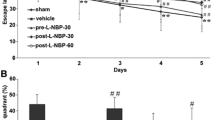Abstract
Objectives
To evaluate the effect of echinacoside (ECH) on cognitive dysfunction in post cerebral stroke model rats.
Methods
The post stroke cognitive impairment rat model was created by occlusion of the transient middle cerebral artery (MCAO). The rats were randomly divided into 3 groups by a random number table: the sham group (sham operation), the MCAO group (received operation for focal cerebral ischemia), and the ECH group (received operation for focal cerebral ischemia and ECH 50 mg/kg per day), with 6 rats in each group. The infarct volume and spatial learning were evaluated by triphenyl tetrazolium chloride staining and Morris water maze. The expression of α7nAChR in the hippocampus was detected by immunohistochemistry. The contents of acetylcholine (ACh), malondialdehyde (MDA), glutathione (GSH), superoxide dismutase (SOD), activities of choline acetyltransferase (ChAT), acetylcholinesterase (AChE), and catalase (CAT) were evaluated by enzyme linked immunosorbent assay. The neural apoptosis and autophagy were determined by TUNEL staining and LC3 staining, respectively.
Results
ECH significantly lessened the brain infarct volume and ameliorated neurological deficit in infarct volume and water content (both P<0.01). Compared with MCAO rats, administration of ECH revealed shorter escape latency and long retention time at 7, 14 and 28 days (all P<0.01), increased the α7nAChR protein expression, ACh content, and ChAT activity, and decreased AChE activity in MCAO rats (all P<0.01). ECH significantly decreased MDA content and increased the GSH content, SOD, and CAT activities compared with MCAO rats (all P<0.05). ECH suppressed neuronal apoptosis by reducing TUNEL-positive cells and also enhanced autophagy in MCAO rats (all P<0.01).
Conclusion
ECH treatment helped improve cognitive impairment by attenuating neurological damage and enhancing autophagy in MCAO rats.
Similar content being viewed by others
Data Availability
The data used to support the findings of this study are available from the corresponding author upon request.
References
Venketasubramanian N, Yoon BW, Pandian J, Navarro JC. Stroke epidemiology in south, east, and south-east Asia: a review. J Stroke 2017;19:286–294.
Benjamin EJ. Heart disease and stroke statistics-2018 update: a report from the American Heart Association. Circulation 2018;137:467–492.
Towfghi A, Saver JL. Stroke declines from third to fourth leading cause of death in the United States: historical perspective and challenges ahead. Stroke 2011;42:2351–2355.
Sun JH, Tan L, Yu JT. Post-stroke cognitive impairment: epidemiology, mechanisms and management. Ann Tran’s Med 2014;2:80.
Woitzik J, Back T, Tome C. Flow-dependent versus spreading-like impairment of brain tissue integrity during focal cerebral ischemia and its consequences for neuroprotective strategies. Front Biosci 2008;13:1500–1506.
Johnson W, Onuma O, Owolabi M, Sachdev S. Stroke: a global response is needed. Bull World Health Organ 2016;94:634–634A.
He HW, Zhang YL, Yu BQ, Ye G, You W, So KF, et al. Soluble Nogo receptor 1 fusion protein protects neural progenitor cells in rats with ischemic stroke. Neural Regen Res 2019;14:1755–1764.
Wang YZ, Zhang HY, Liu F, Li L, Deng SM, He ZY. Association between PPARG genetic polymorphisms and ischemic stroke risk in a northern Chinese Han population: a case-control study. Neural Regen Res 2019;14:1986–1993.
Pantoni L. Have stroke neurologists entered the arena of stroke-related cognitive dysfunctions? Not yet, but they should. Stroke 2017;48:1441–1442.
Pendlebury ST, Rothwell PM. Prevalence, incidence, and factors associated with pre-stroke and post-stroke dementia: a systematic review and meta-analysis. Lancet Neurol 2009:8:1006–1018.
Leys D. Poststroke dementia. Lancet Neurol 2005;4:752–759.
Obaid M. Long-term outcomes in stroke patients with cognitive impairment: a population-based study. Geriatrics (Basel) 2020;5:32.
Gottesma RF, Hillis AE. Predictors and assessment of cognitive dysfunction resulting from ischaemic stroke. Lancet Neurol 2010;9:895–905.
Sheng R, Qin ZH. The divergent roles of autophagy in ischemia and preconditioning. Acta Pharmacol Sin 2015;36:411–420.
Ke P, Shao BZ, Xu ZQ, Chen XW, Liu C. Intestinal autophagy and its pharmacological control in inflammatory bowel disease. Front Immunol 2017;7:695.
Shao BZ, Han BZ, Zeng YX, Su DF, Liu C. The roles of macrophage autophagy in atherosclerosis. Acta Pharmacol Sin 2016;37:150–156.
Shirakabe A, Ikeda Y, Sciarretta S, Zablocki DK, Sadoshima J. Aging and autophagy in the heart. Circ Res 2016;118:1563–1576.
Deretic V, Saitoh T, Akira S. Autophagy in infection, inflammation and immunity. Nat Rev Immunol 2013;13:722–737.
Liu J, Yang L, Dong Y, Zhang B, Ma X. Echinacoside, an inestimable natural product in treatment of neurological and other disorders. Molecules 2018;23:1213.
Chen M, Wang X, Hu B, Zhou J, Wang X, Wei W, et al. Protective effects of echinacoside against anoxia/reperfusion injury in H9c2 cells via up-regulating p-AKT and SLC8A3. Biomed Pharmacother 2018;104:52–59.
Li L, Wan G, Han B, Zhang Z. Echinacoside alleviated LPS-induced cell apoptosis and inflammation in rat intestine epithelial cells by inhibiting the mTOR/STAT3 pathway. Biomed Pharmacother 2018;104:622–628.
Liu JJ, Yang LL, Dong YH, Zhang B, Ma XQ. Echinacoside, an inestimable natural product in treatment of neurological and other disorders. Molecules 2018;23:41–70.
Wei LL, Chen H, Jiang Y, Tu PF, Du J, Zhong M, et al. Effects of echinacoside on lipid peroxidation in cerebral ischemia rats. Chin J Inf Tradit Chin Med 2011;18:36–37.
Du J, Chen H, Jiang Y, Tu PF. Protective effect of echinacoside on cerebral ischemia rats. Lishizhen Med Mater Med Res (Chin) 2010;21:1324–1325.
Lei L, Yang F, Zhang T, Tu P, Wu L, Ito Y. Preparative isolation and purification of acteoside and 2’-acetyl acteoside from Cistanches salsa (C.A. Mey.) G. Beck by high-speed counter-current chromatography. J Chromatogr A 2001;912:181–185.
Wei W, Lan XB, Liu N, Yang JM, Du J, Ma L, et al. Echinacoside alleviates hypoxic-ischemic brain injury in neonatal rat by enhancing antioxidant capacity and inhibiting apoptosis. Neurochemical Res 2019;44:1582–1592.
Ni Y, Deng J, Liu X, Li Q, Zhang J, Bai H, et al. Echinacoside reverses myocardial remodeling and improves heart function via regulating SIRT1/FOXO3a/MnSOD axis in HF rats induced by isoproterenol. J Cell Mol Med 2021;25:203–216.
Gai X, Lin P, He Y, Lu D, Li Z, Liang Y, et al. Echinacoside prevents hypoxic pulmonary hypertension by regulating the pulmonary artery function. J Pharmacol Sci 2020;144:237–244.
Knierim JJ. The hippocampus. Current Biol 2015;25:1116–1121.
Broughton BRS, Reutens DC, Sobey CG. Apoptotic mechanisms after cerebral ischemia. Stroke 2009;40:331–339.
Koh P. Nicotinamide attenuates the ischemic brain injury-induced decrease of Akt activation and Bad phosphorylation. Neurosci Lett 2011;498:105–109.
Pei B, Yang M, Qi X, Shen X, Chen X, Zhang F. Quercetin ameliorates ischemia/reperfusion-induced cognitive deficits by inhibiting ASK1/JNK3/caspase-3 by enhancing the Akt signaling pathway. Biochem Biophys Res Commun 2016;478:199–205.
Wang P, Shao BZ, Deng Z, Chen S, Yue Z, Miao CY. Autophagy in ischemic stroke. Prog Neurobiol 2018;163:98–117.
Jeong JK, Park SY. Melatonin regulates the autophagic flux via activation of alpha-7 nicotinic acetylcholine receptors. J Pineal Res 2015;59:24–37.
Sun X, Wang D, Zhang T, Lu X, Duan F, Ju L, et al. Eugenol attenuates cerebral ischemia-reperfusion injury by enhancing autophagy via AMPK-mTOR-P70S6K Pathway. Front Pharmacol 2020;11:84–95.
Ao LY, Li WT, Zhou L, Yan YY, Ye AQ, Liang BW, et al. Therapeutic effects of JLX-001 on ischemic stroke by inducing autophagy via AMPK-ULK1 signaling pathway in rats. Brain Res Bull 2019;153:162–170.
Gabryel B, Kost A, Kasprowska D. Neuronal autophagy in cerebral ischemia-a potential target for neuroprotective strategies? Pharmacol Rep 2012;64:1–15.
Acknowledgments
Not applicable.
Author information
Authors and Affiliations
Contributions
Ding L performed experiments and wrote the manuscript; Ye H performed experiments and revised the manuscript; Gu LD and Du AQ performed experiments, provided statistical analysis; Yuan XL conceived the idea, designed and supervised the study. All authors read and approved the final version.
Corresponding author
Additional information
Conflicts of Interest
The authors declare no conflicts of interest.
Supported by Talents Training Program of Pudong Hospital Affiliated to Fudan University (No. PX202007)
Rights and permissions
About this article
Cite this article
Ding, L., Ye, H., Gu, Ld. et al. Echinacoside Alleviates Cognitive Impairment in Cerebral Ischemia Rats through α 7nAChR-Induced Autophagy. Chin. J. Integr. Med. 28, 809–816 (2022). https://doi.org/10.1007/s11655-022-2893-4
Accepted:
Published:
Issue Date:
DOI: https://doi.org/10.1007/s11655-022-2893-4




